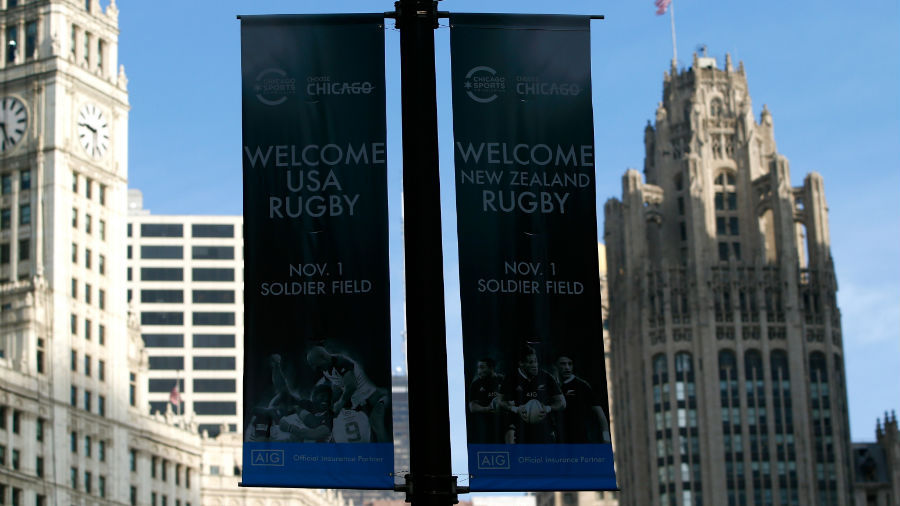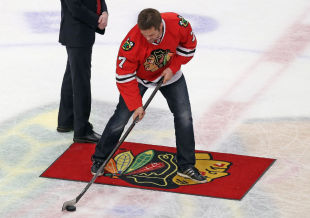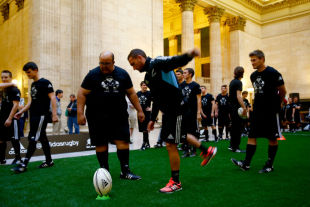|
USA Eagles v New Zealand
Breaking new ground in the Windy City
Tom Hamilton in Chicago
October 30, 2014

© Getty Images
Enlarge
The All Blacks' first tentative steps on to the streets of Chicago saw them greeted with blank faces - a far cry from their status as heroes back in New Zealand. The local sports agenda is focused on the Bears' recent awful run in NFL, the imminent start of the Chicago Bulls' season, and the NHL's Blackhawks, who are also in action this week. But walking down Michigan Avenue, the New Zealanders will see banners attached to the lamp posts welcoming them to town. "That has never happened before for the sport in this country," USA Rugby chief executive Nigel Melville tells me as we sit at the bar in a vast hotel in downtown Chicago. There is a sense that the city is still growing accustomed to having rugby at Soldier Field - the Bears' hallowed football turf - but there are fledgling signs of All Black life here in the Windy City. Wandering from block to block, I catch the odd individual sporting a black bobble hat embroidered with a white fern. But until Saturday comes around, it is the New Zealanders who are exploring the city wide-eyed and gawping, instead of their usual position as the ones who are being ogled.

All Black Richie McCaw tries hockey during the Blackhawks' game against the Ducks
© Getty Images
Enlarge
On Tuesday, the players were greeting commuters at Union Station and, come evening, Richie McCaw was shooting the puck during a break in the Blackhawks' game against the Ducks. On Wednesday, they had their first taste of Soldier Field. The Kiwis are dipping their toes into America's sporting melting pot, but by the time the final ball has been passed or kicked in Saturday's match, Melville is certain those in the stadium and others watching on television will be left with no illusion over rugby's potential in the country. It was a match that came about thanks to a talk over coffee between Melville and his opposite number in the New Zealand Rugby Union, Steve Tew. "Last November at the IRB assembly in Dublin, Steve Tew and I were discussing how the All Blacks had just come to Europe via Tokyo," Melville tells ESPN. "And I made a passing comment that they should come and play us when they travelled over in 2014. He asked if I was serious ... I was. We discussed it further and established there were a few criteria that had to be fulfilled. There was the business side of it and there were other logistics." In sport, such facets and riders are seldom easily sorted. But while talking to Melville, it is clear there is no challenge too big or small for him as he seeks to grow the game in the country. The All Blacks' various demands were met.
"They were going to England so they wanted a direct flight there and they wanted to be on the East Coast," Melville says. "They wanted to play in an iconic stadium, ideally not a soccer one. So if you go to a big stadium here, you go for a football one but very few can house a rugby pitch as they are bowl shaped. While you might have the right width at the halfway mark, when you get to the try line, it is too narrow - some don't even fit at all. "We had to find one with grass as they didn't want to play on turf, so that left about three in America that fitted the criteria. There is Soldier Field here in Chicago and we looked at the Eagles' in Philadelphia. We also looked at the MetLife Stadium but that didn't really work. The Yankees' stadium was just about right and we could have perhaps gone to Houston but we found this place in Chicago and we started discussions. "The New Zealand guys came over to look at it and we agreed on the length of field and all the other sides of the deal. We were up and running in a month." With the ink drying on the contract, the realisation of the task facing Melville hit home. The USA Eagle's biggest attendance going into Saturday's game was against Ireland in 2013, when they sold 20,181 tickets. To sell out Soldier Field, they had to shift treble that.

Aaron Cruden in Chicago Union Station
© Getty Images
Enlarge
"To make it economically sound we had to make it to 35,000 tickets or so which is already half on top of our record. We started off by making sure we sold the tickets in the TV arc at least. We did a pre-sale before the event to MasterCard holders and to the Bears' season ticket holders and they took 4,000. We sold 35,000 in a week and that was a good indicator of how things were going to go. And now here we are at 61,500 tickets sold." For Melville, the stress of selling the tickets has now abated, as have the worries over whether the USA were going to have their best players available due to the headache of the IRB's Regulation 9. Melville was able to strike a deal with Premiership Rugby, which freed the way for the likes of Samu Manoa, Chris Wyles and Blaine Scully to face the All Blacks on Saturday. It has all clicked into place neatly so far, but now the Eagles need to put on a good show to capitalise on all this hard work. When USA Rugby was founded in 1975, an event like this weekend's would have been nothing more than a pipe dream. Saturday's game will be no fool's paradise. "We need to be realistic, we want the guys to play well and show what they are capable of," Melville says. "It will be awesome to see the All Blacks here and the folk of Chicago and America will be able to see what the game is all about - the camaraderie, the anthems, the skills, the athleticism, the speed and the thrill of it. "It'll be 61,500 people, watching rugby in a football stadium. It has to be good, it has been 40 years in the making." © ESPN Sports Media Ltd Tom Hamilton is the Associate Editor of ESPNscrum.
| |||||||||||||||
Live Sports
Communication error please reload the page.
-
Football
-
Cricket
-
Rugby
-
- Days
- Hrs
- Mins
- Secs
F1 - Abu Dhabi GP
Abu Dhabi Grand Prix December 11-131. Max Verstappen ()
2. Valtteri Bottas (Mercedes)
3. Lewis Hamilton (Mercedes)
4. Alexander Albon ()
5. Lando Norris ()
6. Carlos Sainz Jr ()
-
ESPNOtherLive >>
Darts - Premier League
Golf - Houston Open
Snooker - China Open
Tennis - Miami Open

